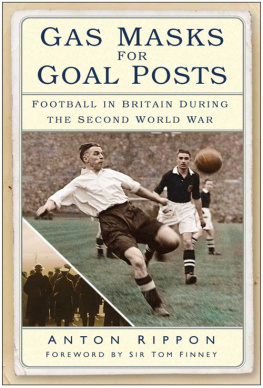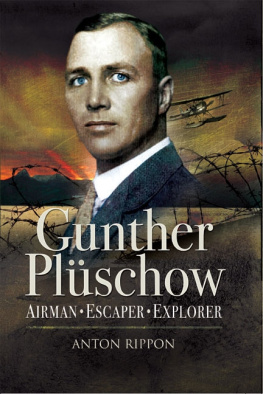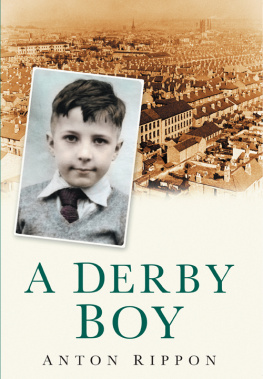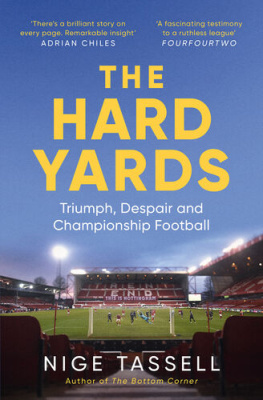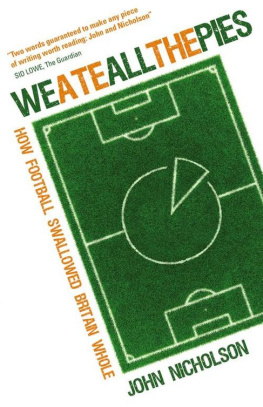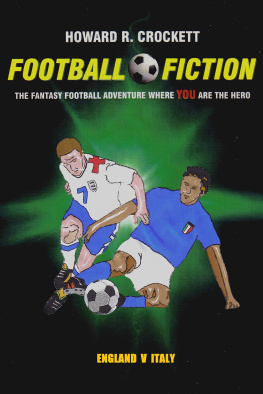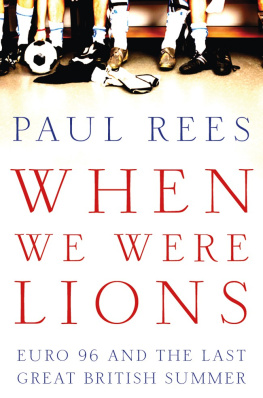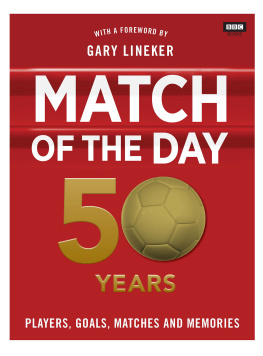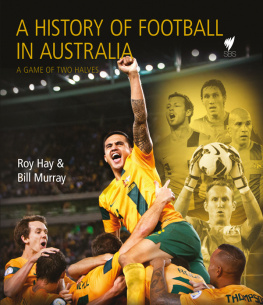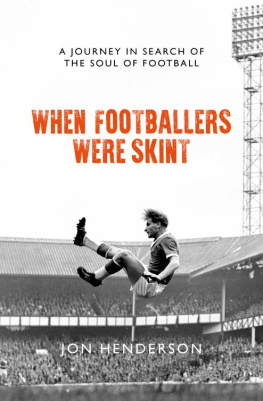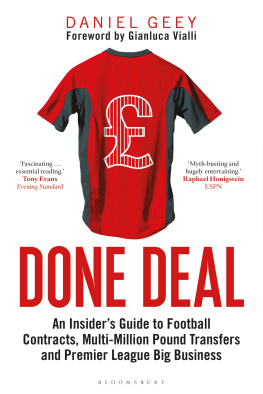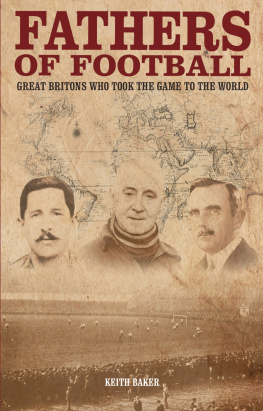GAS MASKS
FOR
GOAL POSTS
G AS M ASKS
F OR
G OAL P OSTS
F OOTBALL IN B RITAIN D URING THE S ECOND W ORLD W AR
A NTON R IPPON
F OREWORD BY
S IR T OM F INNEY
First published in 2005
This edition first published in 2007
The History Press
The Mill, Brimscombe Port
Stroud, Gloucestershire, GL 5 2 QG
www.thehistorypress.co.uk
This ebook edition first published in 2011
All rights reserved
Anton Rippon, 2011
The right of Anton Rippon, to be identified as the Author of this work has been asserted in accordance with the Copyrights, Designs and Patents Act 1988.
This ebook is copyright material and must not be copied, reproduced, transferred, distributed, leased, licensed or publicly performed or used in any way except as specifically permitted in writing by the publishers, as allowed under the terms and conditions under which it was purchased or as strictly permitted by applicable copyright law. Any unauthorised distribution or use of this text may be a direct infringement of the authors and publishers rights, and those responsible may be liable in law accordingly.
EPUB ISBN 978 0 7524 7188 4
MOBI ISBN 978 0 7524 7187 7
Original typesetting by The History Press
C ONTENTS
F OREWORD
by Sir Tom Finney
W hen war was declared in September 1939, I was 17 years old and serving my apprenticeship as a plumber, while at the same time making my way with Preston North End. None of us knew how the war would affect our lives, but for me it meant a chance in Prestons first team a little sooner than might otherwise have been the case. I signed professional forms in January 1940, made my debut against Liverpool at Anfield at the start of the following season, and by the end of it was playing against Arsenal in a cup final. Facing players like Eddie Hapgood and Cliff Bastin at Wembley had been beyond my wildest dreams. For many other players, of course, the war had the opposite effect, ending their careers prematurely, robbing them of the last few years of their footballing days. Plenty of others, in their prime when war was declared, lost several years before picking up the pieces again in 1946. Some paid the ultimate price and never returned from the fighting. War changes the course of peoples lives for ever. Footballers are no different from any other.
My memories of wartime football are many and varied. I saw active service with the Royal Armoured Corps but also had the opportunity to play alongside and against some of the games finest players in services football, both at home and in the Middle East and Italy. My own club lost its ground for a couple of years and I can remember training on Tuesday and Thursday evenings at a Deepdale surrounded by barbed wire after it became a prisoner of war camp. It was an unusual time of regional football, guest players and many difficulties caused by travel restrictions and the like. Supporters would arrive at grounds not knowing who would be playing for their team. Sometimes they would have a pleasant surprise when a star guest had been enlisted for the afternoon. There are some hilarious tales of the lengths those players had gone to in order to play. Most of all, football was important to people. It kept morale high and helped give us a sense of normality in abnormal times.
It is a pleasure to provide the Foreword for Anton Rippons fascinating account of this unique era in footballs history. His book captures perfectly the atmosphere of the game in those difficult days from 1939 to 1945.
A CKNOWLEDGEMENTS
T his book could not have been written without the help of a large number of people, not least the football historians who, since 1985 in particular, have published an astonishing wealth of information on their clubs; they should all be saluted. Their works are included in the Bibliography, but special thanks go to Scott Cheshire, Keith Farnsworth, Frank Grande, Martin Jarred, Robert McElroy, Fred Ollier and David Woods, all of whom were kind enough to answer specific queries. Where possible, I have gone back to original sources and this has sometimes resulted in my account differing from what has been previously published. Over the years, several former players, some of whom, alas, are no longer with us, have indulged me: Sam Bartram, Cliff Bastin, Frank Broome, Jimmy Bullions, Raich Carter, George Collin, Peter Doherty, Dally Duncan, Arnie Grace, Jimmy Hagan, Dennis Herod, Jack Howe, Tommy Lawton, Wilf Mannion, Jack Stamps, Bert Sproston, Ken Teasdale, Tim Ward and Jack Wheeler all gave me their time. Apart from answering my questions, Sir Tom Finney also did me the singular honour of providing the Foreword. Andrew Ward allowed me access to his own player interviews and also gave enormous support, encouragement and advice, as well as allowing me to use the description he coined: Footballs Vera Lynns. Geron Swann kindly made available material from his interview with Vic Barney. Thanks also go to Colin Bruce of the Imperial War Museum, Tim Challis of the RAF Personnel Management Agency, Carol Cooper of the Children and Families of Far East Prisoners of War, Peter Crocker of the Royal Welch Fusiliers, Geoff Cushing, Peter Drake of Birmingham Central Library, Howard Fear, Jezael Fritsche of the Swiss FA, Brian Harris, Peter Lockett, Derek Lockton, Tom Mason, David Murphy of the Royal Scots Regimental Museum, Jonathan and George Plunkett, Gordon Rosenthal, Harry Shinkfield of 77 Squadron Association, and Eddie Whyte. Thanks also to my agent, John Pawsey, and to Sarah Bryce of Sutton Publishing, both of whom showed enormous enthusiasm for the book. And thanks to Pat, and to Nicola, for indulging me, as always.
ONE
A S TIFLING A FTERNOON
Surely there couldnt be room for professional football in a world gone crazy?... I wound up my personal affairs, cursed Hitler and all his works, and, occasionally, sat down to think of what had been, and what might have been.
Tommy Lawton, Everton and England
T here should have been plenty to talk about as football supporters all over Britain headed for the exits on 2 September 1939. On the second Saturday of the new season, Blackpool had beaten Wolves 21 at Bloomfield Road to lead the First Division with maximum points. Ted Drake had scored four times in Arsenals 52 win over Sunderland. In the Second Division, Newcastle United had put 8 goals past Swansea Town. In the Third Division South, Bournemouth and Boscombe Athletic had scored 10 against Northampton Town. The Glasgow giants, Celtic and Rangers, had both won, but in Edinburgh there was a surprise when Albion Rovers, relative newcomers to Scotlands top division, beat Hibernian 53 at Easter Road. Yet on the trams and buses taking supporters home for their tea on that stifling, brooding afternoon, no-one said very much. It was the same in every dressing room. At the Baseball Ground, the Derby players who had just defeated Aston Villa decided to meet again that evening in a local pub, to discuss what the future might hold. At The Valley, the game between Charlton Athletic and Manchester United had been a tedious affair, the players apparent lack of interest mirroring that of the 8,608 supporters who had bothered to turn up to a ground which, the previous year, had housed 75,000. Even a 20 home win had failed to spark any celebrations. The mood of the Manchester City players who had beaten Chesterfield was not helped by the sight of barrage balloons on the skyline around Maine Road. At Highbury, where the kick-off had been put back for two hours because of traffic congestion as the first of Londons children were evacuated from the capital, the atmosphere was especially subdued. Even Ted Drake, rarely short of a few wisecracks, had little to say, despite his 4 goals. For once, the result of a football match seemed unimportant.

